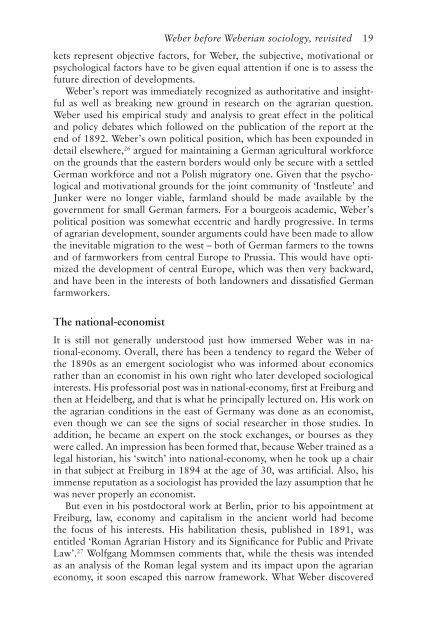Understanding Weber
Understanding Weber
Understanding Weber
Create successful ePaper yourself
Turn your PDF publications into a flip-book with our unique Google optimized e-Paper software.
<strong>Weber</strong> before <strong>Weber</strong>ian sociology, revisited 19<br />
kets represent objective factors, for <strong>Weber</strong>, the subjective, motivational or<br />
psychological factors have to be given equal attention if one is to assess the<br />
future direction of developments.<br />
<strong>Weber</strong>’s report was immediately recognized as authoritative and insightful<br />
as well as breaking new ground in research on the agrarian question.<br />
<strong>Weber</strong> used his empirical study and analysis to great effect in the political<br />
and policy debates which followed on the publication of the report at the<br />
end of 1892. <strong>Weber</strong>’s own political position, which has been expounded in<br />
detail elsewhere, 26 argued for maintaining a German agricultural workforce<br />
on the grounds that the eastern borders would only be secure with a settled<br />
German workforce and not a Polish migratory one. Given that the psychological<br />
and motivational grounds for the joint community of ‘Instleute’ and<br />
Junker were no longer viable, farmland should be made available by the<br />
government for small German farmers. For a bourgeois academic, <strong>Weber</strong>’s<br />
political position was somewhat eccentric and hardly progressive. In terms<br />
of agrarian development, sounder arguments could have been made to allow<br />
the inevitable migration to the west – both of German farmers to the towns<br />
and of farmworkers from central Europe to Prussia. This would have optimized<br />
the development of central Europe, which was then very backward,<br />
and have been in the interests of both landowners and dissatisfied German<br />
farmworkers.<br />
The national-economist<br />
It is still not generally understood just how immersed <strong>Weber</strong> was in national-economy.<br />
Overall, there has been a tendency to regard the <strong>Weber</strong> of<br />
the 1890s as an emergent sociologist who was informed about economics<br />
rather than an economist in his own right who later developed sociological<br />
interests. His professorial post was in national-economy, first at Freiburg and<br />
then at Heidelberg, and that is what he principally lectured on. His work on<br />
the agrarian conditions in the east of Germany was done as an economist,<br />
even though we can see the signs of social researcher in those studies. In<br />
addition, he became an expert on the stock exchanges, or bourses as they<br />
were called. An impression has been formed that, because <strong>Weber</strong> trained as a<br />
legal historian, his ‘switch’ into national-economy, when he took up a chair<br />
in that subject at Freiburg in 1894 at the age of 30, was artificial. Also, his<br />
immense reputation as a sociologist has provided the lazy assumption that he<br />
was never properly an economist.<br />
But even in his postdoctoral work at Berlin, prior to his appointment at<br />
Freiburg, law, economy and capitalism in the ancient world had become<br />
the focus of his interests. His habilitation thesis, published in 1891, was<br />
entitled ‘Roman Agrarian History and its Significance for Public and Private<br />
Law’. 27 Wolfgang Mommsen comments that, while the thesis was intended<br />
as an analysis of the Roman legal system and its impact upon the agrarian<br />
economy, it soon escaped this narrow framework. What <strong>Weber</strong> discovered




